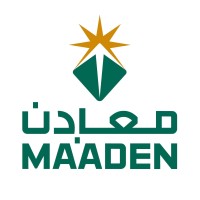
Barrick
We are committed to partnering with our host countries and communities to transform their natural resources into tangible benefits for mutual prosperity.



We are committed to partnering with our host countries and communities to transform their natural resources into tangible benefits for mutual prosperity.

Maaden is Saudi Arabia’s engine of industrial transformation and one of the world’s top ten mining giants by market cap and fastest growing globally. We’re building the future of mining, creating fully integrated value chains across gold, phosphate, bauxite, copper and beyond. Maaden’s new era of growth is at pace and scale unlike anything the industry has ever seen. We’re doubling gold production by 2030, investing SAR 420 billion ($112 billion) through 2040 and scaling world-class projects that will redefine what’s possible for Saudi mining. This isn’t evolution; it’s transformation at speed, at scale and with purpose. Since going public in 2008, Maaden has invested over SAR 120 billion ($32 billion) to build large-scale, long-life, cost-competitive operations that deliver both world-class products and strong returns. We help power Saudi Vision 2030 by making mining a key pillar of a diversified and sustainable economy beyond oil. We’re creating new industries, new jobs and new opportunities. With a team of over 8,000 people, Maaden is writing the next chapter of industrial progress in Saudi Arabia. Join us as we shape the future of mining and unearth tomorrow, together.
Security & Compliance Standards Overview












No incidents recorded for Barrick in 2025.
No incidents recorded for Maaden in 2025.
Barrick cyber incidents detection timeline including parent company and subsidiaries
Maaden cyber incidents detection timeline including parent company and subsidiaries
Last 3 Security & Risk Events by Company
Angular is a development platform for building mobile and desktop web applications using TypeScript/JavaScript and other languages. Prior to versions 19.2.16, 20.3.14, and 21.0.1, there is a XSRF token leakage via protocol-relative URLs in angular HTTP clients. The vulnerability is a Credential Leak by App Logic that leads to the unauthorized disclosure of the Cross-Site Request Forgery (XSRF) token to an attacker-controlled domain. Angular's HttpClient has a built-in XSRF protection mechanism that works by checking if a request URL starts with a protocol (http:// or https://) to determine if it is cross-origin. If the URL starts with protocol-relative URL (//), it is incorrectly treated as a same-origin request, and the XSRF token is automatically added to the X-XSRF-TOKEN header. This issue has been patched in versions 19.2.16, 20.3.14, and 21.0.1. A workaround for this issue involves avoiding using protocol-relative URLs (URLs starting with //) in HttpClient requests. All backend communication URLs should be hardcoded as relative paths (starting with a single /) or fully qualified, trusted absolute URLs.
Forge (also called `node-forge`) is a native implementation of Transport Layer Security in JavaScript. An Uncontrolled Recursion vulnerability in node-forge versions 1.3.1 and below enables remote, unauthenticated attackers to craft deep ASN.1 structures that trigger unbounded recursive parsing. This leads to a Denial-of-Service (DoS) via stack exhaustion when parsing untrusted DER inputs. This issue has been patched in version 1.3.2.
Forge (also called `node-forge`) is a native implementation of Transport Layer Security in JavaScript. An Integer Overflow vulnerability in node-forge versions 1.3.1 and below enables remote, unauthenticated attackers to craft ASN.1 structures containing OIDs with oversized arcs. These arcs may be decoded as smaller, trusted OIDs due to 32-bit bitwise truncation, enabling the bypass of downstream OID-based security decisions. This issue has been patched in version 1.3.2.
Suricata is a network IDS, IPS and NSM engine developed by the OISF (Open Information Security Foundation) and the Suricata community. Prior to versions 7.0.13 and 8.0.2, working with large buffers in Lua scripts can lead to a stack overflow. Users of Lua rules and output scripts may be affected when working with large buffers. This includes a rule passing a large buffer to a Lua script. This issue has been patched in versions 7.0.13 and 8.0.2. A workaround for this issue involves disabling Lua rules and output scripts, or making sure limits, such as stream.depth.reassembly and HTTP response body limits (response-body-limit), are set to less than half the stack size.
Suricata is a network IDS, IPS and NSM engine developed by the OISF (Open Information Security Foundation) and the Suricata community. In versions from 8.0.0 to before 8.0.2, a NULL dereference can occur when the entropy keyword is used in conjunction with base64_data. This issue has been patched in version 8.0.2. A workaround involves disabling rules that use entropy in conjunction with base64_data.